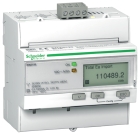Energy meter helps meet targets for energy efficiency

Schneider Electric’s Acti 9 iEM3000 series of energy meters has been designed to help organisations meet energy-efficiency targets. They are mounted on DIN rails and meet the requirements of the Energy Performance of Buildings Directive for automatic energy-monitoring systems in buildings with a floor areas of over 1000 m2.
These meters have native protocol support for Modbus, BACnet, M-bus and LON, so they can be easily integrated into virtually any BMS, AMR or EMS system.
More that just a kWh meter, these units provide a full view of energy consumption and on-site generation, with full 4-quadrant measurement of active and reactive energy delivered and received. Extensive real-time measurements (V, I, P and power factor) give greater detail on energy usage. Multiple tariffs provide the flexibility to match the billing structure of the supply utility.
The capabilities of iEM3000 energy meters include the following.
• Collect and analyse energy consumption data from a range of sources for each type of load or circuit
• Gain an accurate understanding of business expenses by more accurately allocating energy-related costs
• Use data received to implement actions designed to reduce energy consumption
• Monitor the energy consumption of tenants or customers and establish accurate invoices
• Seamlessly integrate the meter(s) into virtually any monitoring system (BMS, AMR, EMS) without the need for extra converters
• MID and non-MID references are available as standard.







